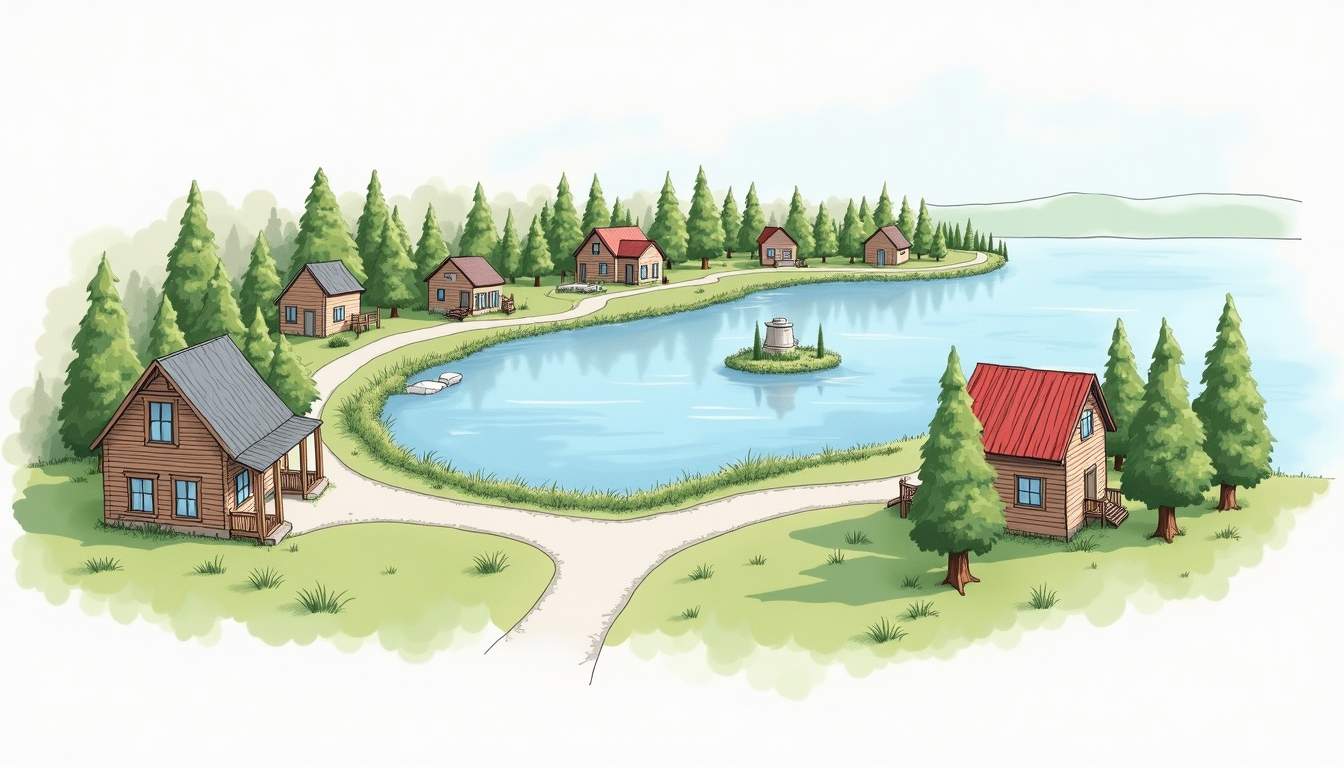
For many retirees, buying lakefront real estate represents a chance to combine natural beauty with a slower pace of life. Access to water, easy outdoor activities, and a sense of community attract buyers seeking comfort, convenience, and a scenic backdrop for daily living. Yet lakefront properties come with unique considerations—from maintenance and insurance to access and resale value. This article outlines practical guidance to help retirees make informed decisions when exploring lakefront home purchases.
Before touring properties, define what matters most: quiet solitude, active boating and fishing, a walkable village nearby, or proximity to healthcare and family. Different lakes and developments cater to different lifestyles—some are oriented toward social communities with docks, clubhouses, and scheduled events; others emphasize privacy and larger plots of land.
Consider mobility and aging-in-place needs. Look for single-level floor plans, gentle thresholds, and wide hallways. Even if current health is excellent, selecting a property with fewer stairs and adaptable spaces reduces the need for future renovations. Think about gardening, parking, and the distance between the house and the shoreline—long walks with groceries or steps down to a boathouse can become burdensome over time.
Not all lakes are the same. Learn about water quality, algae levels, seasonal fluctuations in water level, and the types of recreational activities allowed. Some lakes are managed reservoirs with regulated water levels, while others are shallow or spring-fed and may experience significant seasonal changes.
Investigate local wildlife and vegetation. Lakeside living often comes with rich ecosystems, but that can include invasive species, mosquitoes, and nesting waterfowl. Check whether the lake is prone to heavy aquatic vegetation that might interfere with boating or swimming, and whether local authorities or homeowner associations (HOAs) actively manage such issues.
Examine municipal codes and environmental regulations. Setbacks, riparian rights, and shoreline stabilization rules vary. Some regions impose strict restrictions on dock construction, seawalls, and landscaping within a buffer zone. Knowing these rules upfront prevents surprises and costly modifications after purchase.
Lakefront ownership falls into several categories: true deeded waterfront (private shorefront owned with the property), riparian rights (access to the water granted by law), and access by easement or HOA common areas. Deeded waterfront is typically the most private and valuable, but it also brings full responsibility for shoreline maintenance.

If a property is marketed as “lake view” rather than “lakefront,” confirm whether any public land, road, or private parcel separates the house from the water. Properties with shared community docks or limited boat slips may restrict access at peak times. Ask for documents showing rights to use the shoreline, docks, and boat launches—easements should be recorded and clearly outlined in the title report.
Public access areas can make a lake feel busier than expected. Parks, boat ramps, and fishing piers bring transient visitors, especially on weekends and holidays. Conversely, having a public launch nearby might be advantageous for convenience, but it can reduce privacy and increase noise. Speak with neighbors about typical usage patterns throughout the year to get a realistic sense of activity levels.
Lakefront properties usually command a premium. Beyond purchase price, factor in ongoing costs that are often higher than for inland homes. Flood and wind insurance can be significant, and coverage limits vary by region. Some lenders require separate policies for windstorm or flood, and premiums can change based on elevation and historical claims data.
Property tax assessments may reflect waterfront premium and can increase over time. Additionally, shoreline erosion control, dock repairs, and seawall maintenance are recurring expenses. Landscaping on a slope or near water often requires specialized contractors who understand erosion control and native planting to comply with environmental rules.
HOA fees should be scrutinized for what they cover: dock maintenance, common area upkeep, road plowing, water testing, and community amenities. A well-managed HOA can add value and reduce personal maintenance burdens, but unstable or underfunded HOAs can lead to special assessments that are costly and unexpected.
A thorough home inspection is essential, but lakefront homes warrant additional specialized inspections. Hire inspectors experienced with waterfront properties who can evaluate foundation stability, seawall condition, drainage, and evidence of water intrusion. Check for mold and moisture damage, which can be more common near bodies of water.
Consider a geotechnical or shoreline engineering assessment if the property shows signs of erosion, bluff instability, or poorly stabilized banks. These professionals can estimate costs for stabilization, predict future erosion scenarios, and recommend mitigation measures. For homes with private wells or septic systems, have water quality tests and septic inspections performed to ensure compliance and safety.
Structures on the water can be valuable but also subject to additional regulations, maintenance, and liability. Confirm whether the dock is permitted and in good repair. Seasonal variations, ice, and storms can all cause damage, and replacement can be costly. Mooring rights, slip rental availability, and limitations on boat size or motor types should be verified with local authorities or the HOA.
Proximity to emergency medical services becomes more important with age. Evaluate travel time to hospitals, urgent care, and pharmacy services. Check availability of reliable cell service and internet—both are critical for telemedicine, communication with family, and everyday convenience.
Emergency response on water differs from land-based calls. If boating is a key part of the lifestyle, look into local marine patrol, volunteer rescue services, and community boating safety resources. If the property is remote or accessed by narrow roads, ensure that emergency vehicles can navigate the route in all seasons.
Social life and community activities often influence quality of life more than the physical features of the home. Some lakeshore communities have active clubs, volunteer groups, and events tailored to retirees, while others are seasonal and see population swings between summer and winter.

Visit the area during different seasons to gauge year-round livability. Winter can reveal hidden challenges like limited services, closed businesses, or difficult road conditions. Talk to full-time residents about heating costs, snow removal, and whether community services remain robust after the tourist season ends.
Retirement often includes more frequent visits from family and friends. Consider travel time from major airports, drive times for relatives, and whether the property has sufficient guest space. Nearby amenities like grocery stores, banks, and pharmacies matter more when mobility decreases. Think about how easy it will be for loved ones to visit and provide support if needed.
Although retirement might be intended as the final move, it’s practical to consider resale and estate planning. Marketability depends on features such as single-level living, low-maintenance yards, and adaptable spaces that appeal to a broad range of buyers. Unique or highly personalized upgrades that fit a specific taste may limit future buyers.
Discuss estate planning with professionals to determine how the property will transfer to heirs, and whether special measures—like a trust—are advisable to avoid probate complications. Waterfront properties can carry sentimental value for families, but tax implications, maintenance responsibilities, and shared ownership among heirs can create friction if not addressed in advance.
Timing the purchase can influence price and supply. In some markets, off-season purchases yield more negotiating leverage as inventory increases and sellers are more motivated. However, summer months may provide a better sense of the lake’s activity and maintenance needs. Balance the advantage of negotiation with the need to see the property under conditions that reflect typical use.
Use inspection findings as tools for negotiation; well-documented repair estimates or permit discrepancies can justify price adjustments or seller concessions. If major shoreline work is required, consider asking for escrowed funds to cover anticipated stabilization, or request that the seller complete necessary permits before closing.
Moving to a lakefront property can be an opportunity to downsize and simplify, which can reduce maintenance and costs. Create a realistic plan that identifies essentials, sentimental items, and belongings that are better kept in storage or passed on to family. If the new home has less indoor space, prioritize multifunctional furniture and clever storage solutions that keep living areas uncluttered.

Plan for seasonal needs. Boating equipment, fishing gear, and outdoor furniture require storage and maintenance; ensure the property has adequate garage or storage space. If winter weather is a factor, prepare for off-season storage and maintenance of watercraft and floatation devices.
Before signing, confirm clear title and recorded easements, review HOA documents and reserves, ensure insurance quotes are in place, and obtain any outstanding engineering reports. Verify that any agreed repairs are completed and documented. Walk the property during a different time of day to check noise levels, neighbor activity, and access points.
Secure contact information for local service providers: a reliable contractor experienced with shoreline work, a septic or well specialist, a landscaper familiar with native plantings and erosion control, and a trusted realtor who knows the lake market. Building a network of local resources saves time and reduces stress after the move.
Lakefront real estate offers a unique blend of beauty and lifestyle, but these properties require thoughtful evaluation beyond aesthetics. By clarifying priorities, understanding the lake and legal access, budgeting for ongoing costs, and engaging the right professionals for inspection and planning, retirees can enjoy lakeside living with confidence. A careful, well-informed purchase helps ensure that the lake becomes a source of relaxation and joy rather than a hidden burden.
Taking time to research, visit in different seasons, and consult with experts makes the difference between a dream home and an unexpected headache. With the right preparation, lakefront living can provide a restorative setting for retirement years, full of outdoor activities, peaceful mornings by the water, and a community that fits personal needs and values.
Ready to find the perfect lakefront home that combines natural beauty with luxury amenities? Tennessee National offers a premier gated community featuring a Greg Norman Signature Golf Course, private marina, waterfront dining, and over 20 exclusive member amenities designed to enrich your retirement years. Whether you prefer a move-in ready residence or a custom-built dream home, our scenic setting and vibrant community provide the ideal backdrop for lakeside living. Schedule a private tour today and start enjoying the unparalleled lifestyle that awaits you.